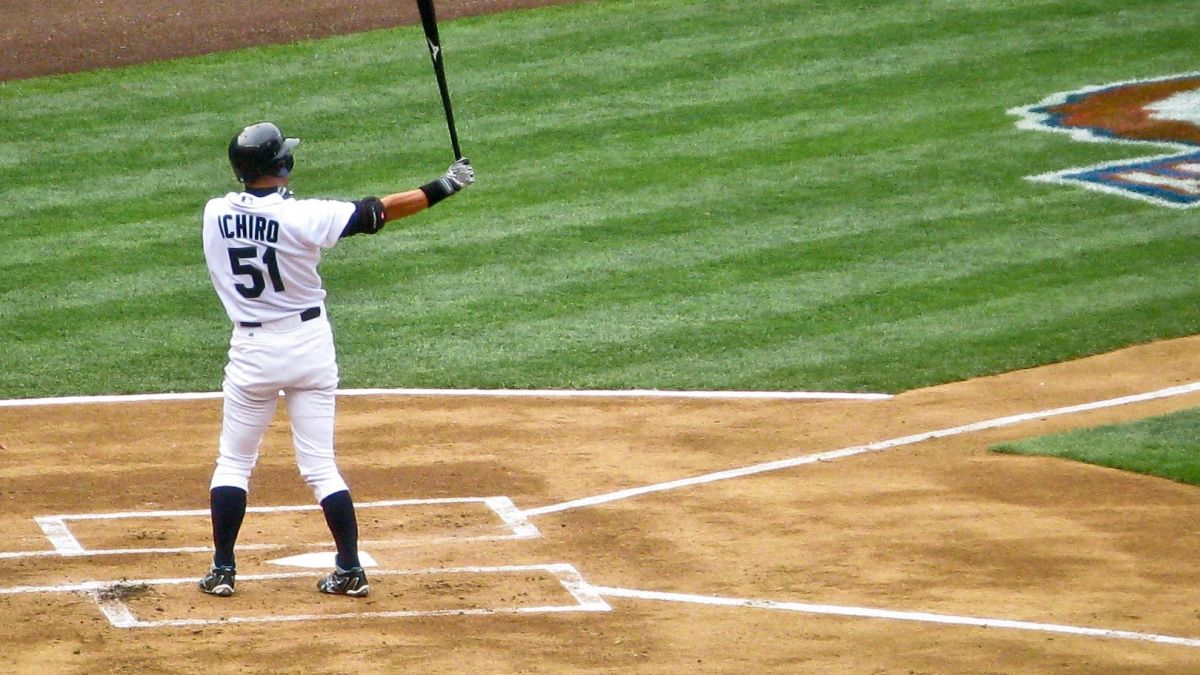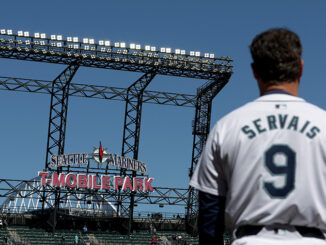
No major American sport is more profoundly emboldened by superstition, nostalgia, and memory than Major League Baseball. In a brief SportsCenter interview with Scott Van Pelt this week, Cal Ripken Jr. said he was thrilled plans for a modified regular season were underway, ignoring the inarguably high, horrific probability of a serious medical disaster if the league’s suggested four and half month quarantine season in Phoenix began soon; and all because he said he remembered how much he enjoyed watching, playing, and, “Because for me baseball is magical.” Ripken backpedaled a bit after Van Pelt pressed him for clarification in lieu of reality. I am also a classically myopic baseball optimist for no good reason. So the ironman gets a pass.
Reliving and re-imagining my own games is a huge part of why I show up hours early to watch both teams take batting practice. I love remembering my holy practicing devotion to every game’s preparations. I can assume many baseball players and fans feel similar passions for the game’s demanding preparation. It is where astute memories and the wisdom of pattern recognition transmogrify into an authentic killer instinct. A player’s memory for relevant facts and trivia is worth more on a baseball field than on any “Jeopardy!” broadcast.
Living, in-game wisdom pulled from the exploits of preparation and memory become a mystical alchemy. When a baseball player is aware of the total moment on hand they predict forthcoming success and earn it if they execute what they’ve practiced. From a deeply, yet magically thought out and rhapsodic distance, our historically great and modern superstar baseball players can become myths and resemble oracles, mystics, shaman and seers. So fans, writers, spectators will often also praise their wild eccentricities. The praise for the weird accentuates the fun in a game marred by constant failure. The gamut of this theatrical parroting manifests itself in the form of dawning replications of physical characteristics like iconic and comic facial hair, to the thousands of kids impersonating the vivified poses of remarkable batting stances and swings.
A near dead-even split between two great mythical players arises when I personally, seriously attempt an answer for baseball’s all time most memorable batter: Babe Ruth and Ichiro Suzuki.
Most of the Mariners organization, and many die-hard M’s fans celebrated Ichiro’s profound international success and memory on social media this week because we eclipsed the one year anniversary of his retirement. Last year, Ichiro became a special advisor for the M’s after signing a contract for and playing in two games hosted by his native country, Japan. But the man still wore a uniform to games after being benched, and he ran around like a man ready to step in and pinch-hit. I half expected Ichiro to do it one day because there is a giddy ridiculous part of me that knows I would love to relive my great many memories of his nearly perfect at bats.
There is no batting stance more iconic to Mariners folklore than Ichiro’s torch-bearing-sword-high right arm extended. That arched backward lean, and the soft raging hyper-focus, the minikin batting glove sleeve pluck, and how he pulled back like an archer, all of it right before the graceful recoil’s pause – and then that jungle cat poised compression inevitably becoming a lithe but deftly explosive monsoon of full sweeping unraveling to swat, smash and slap-contact the ball. It was always clever. It was always a fluid explosion. And it is the best swing I can visualize today, even though Ken Griffey Junior’s swing is a close historical Mariner’s second, it simply isn’t Ichiro’s. It will never be better than Ichiro’s.
There is an abundance of reflection time during our Coronavirus sports shutdown. I’ve been watching classic heavyweight boxing bouts on ESPN. But I can’t stop thinking about baseball and Seattle. Part of what makes professional sports memories so astonishingly compelling are their natural effusive trajectory on and into the pink clouded planes of myths and folk heroes; the easy glissading power we assign great players ascending, how our favorite players become our modern warrior gods among mortals. To me, Seattle’s baseball folk heroes are astronomically magnetic. For some reason, these players hold a zaftig sway nationally too. It’s legendary, documented. And it’s strange.
Pacific northwest baseball players seem the weirdest of these preeminently beloved diamond kings to me too, although maybe this is just that I can list more nationally renowned Mariners superstars than the city’s best players from any other sport or any other team nationally. But aren’t baseball players more bizarre than any other sports superstar?
Consider this, if we label a baseball player weird because we are witnesses to them reflexively adorning their pregame, in-game and post-game action and experience with more socially glorified superstitions than anything outside modern religion; then it is their tics, habits, quirks and anxiety alleviating gesticulations before the glorious action that become the deeply personal mementoes we hold most sacred after the fact.
We can’t perform their true feats off the field or on the field, never the big plays, so we do the little things, and baseball is best when players take care of the little things. Moreover, these quirks are something of a totally public fodder by the time the acts turn into chatter that fans love to F.L.I.P. around and play long toss with.
For example, how many Mariners fans, if you asked them, without hesitating can remember watching pre-game Ichiro imitate a humble, Zen, Spider Man? Stretching his both lean legs so wide askance the Safeco Field grass blades the green tips dipped inside his back pockets, with all his batting glove fingers akimbo? And did you know Lou Pinella used a Spanish translator for discussing in-game strategy with Ichiro because he knew the language better than English? His spirit epitomized the baseball legend, how the best, most thorough preparation created the most success. However, it was nothing more than his perfected swing that said everything worth saying, remembering, replicating in the backyard. It was Ichiro’s perfect, legendary swing that swept through Mariner’s, and the actual baseball nation – hyperbolically, literally.
As a whole, baseball turns its tiniest pieces into spring-loaded rhapsodies. Every swing counts, every pitch is recorded, every action is remembered. Professionals are paid millions to memorize these details. Additionally, baseball has no rival in turning the squalor and dashed hopes of defeat into a predictable future vantage wherein a quixotic, “If I do this one thing right the next time, I will certainly triumph,” type of fortitude adequately disarms the ever-present heft of the game’s all mighty tendency toward symbolic failure.
Failure in baseball is occasionally so sweet it rivals the thrills of true success. The game is flat out strange; but so was the one-named mega star, Ichiro, known best for doing one thing better than any one player in the one sport remarkable for how challenging it is to accomplish its one thing – infamous for how often even the game’s Hall of Fame professionals failed at it – in the single game catalyzing action of hitting the ball. But even true for Ichiro, one type of hit reigns above the rest. And you as well as I should have no qualms about stating plainly: a walk-off home run is the most iconic and powerful action in American sports. There is nothing better.
Amidst the Coronavirus, ESPN has played classic sports events for weeks. I doubt the game I’ll describe next will replay anytime soon because it was otherwise unremarkable until Ichiro’s magnificence left forty seven thousand at Safeco Field simultaneously electrified and thunderstruck. The mythical game took place on September 19, 2009. Mariners and Yankees.
It is well worth remembering; Ichiro was the purest hitter Mariners’s fans had witnessed up until now. Also crucial to note, Griffey was known among M’s fans as a better power hitter than Ichiro.
But I can actually recall hundreds of baseball chats with friends and teammates and coaches about how Ichiro’s effortless swing hid one rapturous yet factual rumor in plain view. And in conversation, someone always inevitably pointed out, if he wanted to, Ichiro could hit sixty home runs a year because his swing was that pure, that powerful, that mechanically perfect. He just chose the high-minded stoicism of the competitive advantage instead of flash because he believed his team’s chances to win improved if he shunned his potentially titanic power hitting stature.
Simple, if he got on base, he could score, and the M’s would have a better chance to win.
So in the bottom of the ninth, M’s down one, and Ichiro on deck for Mike Sweeney’s two-out pinch hit off the wall double, I felt nervous wishing for a classic Ichiro slap single to the opposite field. The M’s could tie the game, we could take our chances in extra innings. I like the idea, especially since Mariano Rivera was pitching flawlessly before Sweeney. The Sandman was still untouchable most games. Rivera actually notched both career strikeouts 999 and 1,000 before Sweeney stepped in and got on. Rivera’s gas and motion were stellar, the Sweeney shot, a fluke. But remember this though, I am, like many from the region, a true Seattle Mariners fan because I am blind to failure, danger, and I am classically myopic optimist for no good reason.
Hope can see the invisible. And Ichiro saw the unseeable. He stepped in, stuck his bat up. Then he predicted Rivera’s first pitch perfectly. The shot was a rocket. Walk-off home run to right.
The legend was real.
Ichiro got mobbed at the plate. During my celebration I accidentally elbowed the fan seated (jumping) next to me in the chin. We grinned at each other. Then I gave this random stranger a monstrous bear hug. We screamed and grabbed each other in the roar for a full minute. It was perfect, ecstatic; and I will never forget it, just like Ichiro’s unbelievably astonishing swing.
This was baseball’s true beauty, everything baseball players dream about. The chance to create and to witness this otherworldly physical beauty. This is why we play, why we show up to watch America’s far and away most heartbreaking game. It is why we love the game during the overwhelming hopelessness implied by the ritual defeat and the imploding dread of memorable disappointment. It is why wise, shrewd, logical people and purely perfect strangers indulge the profoundly emboldened superstition, the nostalgia, and its memory – because it is possible this type of swing could happen, despite the absurdity of believing the impossible is surmountable; in fact, this walk-off was and is a lot like the new far-fetched quarantine season proposal the league dreams about orchestrating in Phoenix. It could happen, yes, and we can talk about it.




